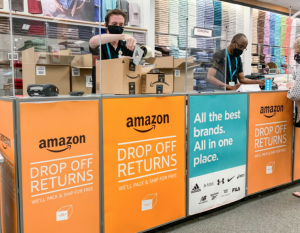 Amazon is attempting new measures to get customers to return fewer of their online orders, including charging a fee to return items to UPS stores.
Amazon is attempting new measures to get customers to return fewer of their online orders, including charging a fee to return items to UPS stores.
For decades, Amazon built its business by creating shopping that was fast, ridiculously easy and, seemingly, error-proof. You don’t like it, just return it.
But not anymore: so many customers have buyers’ regret, or simply bigger feet than they thought they had, that handling returns has become an expensive problem for the company.
So, Amazon will start charging customers a $1 fee if they return items to a UPS store when there is a Whole Foods, Amazon Fresh grocery store or Kohl’s closer to their delivery address. (Amazon owns Whole Foods and Fresh, and has a partnership deal with Kohl’s.)
The Information first reported on Amazon’s fee.
Shoppers have become accustomed to endless free returns in recent years, but Amazon and other companies are trying to curb this customer habit.
Amazon also recently started flagging “frequently returned” products on its website. Amazon is adding the badge to product listings on items with “significantly higher return rates for their product category,” a spokesperson said.
Zara, H&M, J.Crew, Anthropologie, Abercrombie & Fitch and other chains are now slapping on fees of up to $7 to return items online; some retailers have tightened their return windows.
Customers sent back around 17% of the total merchandise they purchased in 2022, totaling $816 billion, according to data from the National Retail Federation.
That’s a strain on retailers: For every $1 billion in sales, the average retailer incurs $165 million in merchandise returns, according to the NRF.
Companies have to cover costly shipping fees in order for customers to send their products back. Those items sometimes wind up back in retailers’ warehouses or on shelves. Stores then have to mark down returned goods to sell them, further squeezing their profit.
More often, returned products can end up in liquidation warehouses or even landfills, which are an environmental threat.
Source: edition.cnn.com










